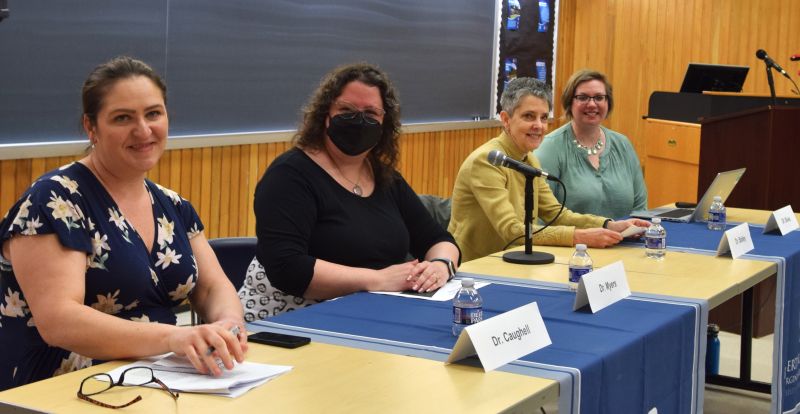Share this Story
Defining Womanhood: 75 Years of “The Second Sex” and Its Impact Across Disciplines
VWU professors engage in a multidisciplinary discussion of Simone de Beauvoir’s groundbreaking work
University News | March 28, 2025

Panelists included Virginia Wesleyan faculty scholars from political science, psychology, sociology, English, and gender studies: Leslie Caughell, Ph.D., Associate Professor of Political Science, Department Chair; Taryn Myers, Ph.D., Professor of Psychology, Department Chair; Jennifer Slivka, Ph.D., Associate Professor of English, Coordinator of Gender, Women, and Sexuality Studies; and Kathy Stolley, Ph.D., Professor of Sociology.
Each panelist reflected on how de Beauvoir’s book shaped their perspectives and its continuing relevance in understanding identity, power, and gender dynamics. They focused on themes such as “the Other,” existential freedom, and societal constructions of femininity, as they highlighted how “The Second Sex” challenges contemporary norms and illuminates paths toward equality.
Dr. Slivka focused her remarks on the “social construction of gender, and how patriarchal society thus constructs woman as an ‘Other,’ i.e. something lesser, inadequate, or lacking.”
“This ‘Othering’ of women oppresses them,” noted Slivka, “and in some ways, continues to do so even today. Because gender is socially constructed, however, de Beauvoir argues that we can re-shape the way we perform our gender (and the expectations that go along with it) to more positively reflect and affect women's lives.”
She shared transitional thoughts and differences between the first wave of feminism (1840s – 1949: Material Rights) and the second wave of feminism (1950 – 1980s: Rights and Materiality) and de Beauvoir’s Foundational Feminist Theory, “One is not born a woman, one becomes one.”
“Are women people?” Dr. Stolley began her remarks by asking this question as she shared sociological perspectives, citing limited gender roles for women and advertisements touting gender-biased products for women from the 1950s and present-day examples that continue to "Other" women, as well as current headlines that call for “more masculine energy in corporate America, even though men run 89% of Fortune 500 companies.”
“Are women people? Yes, of course they are!”
Dr. Myers shared critiques of psychoanalysis from Freud to Existential Therapy and modern evidence-based treatments such as cognitive therapy and objectification theory to understand women’s lived experiences and mental health risks.
“As numerous feminist theorists have argued, women often develop an observer’s perspective of their physical selves with consequences resulting in depression, sexual dysfunction and eating disorders.”
Dr. Caughell talked about the political contexts of opinions and attitudes which come out of social and cultural constructs. “What people think about the world is often a product of their surroundings, influenced by the values of those around them. We are all constantly trying to figure out who we are. We often talk about what is, when what we really ought to spend time thinking about is how things ought to be and how we can make them better.”
Learn more about the Robert Nusbaum Center at VWU.

